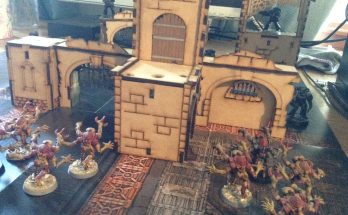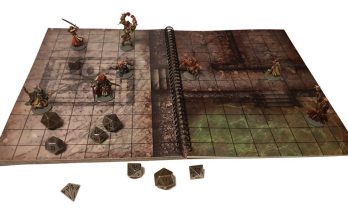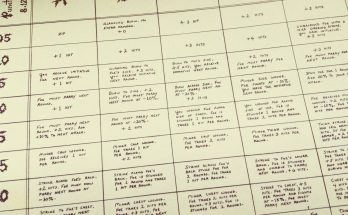Role-playing games in the ‘80s were typified by two things: random character generation, and big-ass tables. Only the trendy systems used point buy. Rolling up your character meant literally rolling up your character where Actual Dice were thrown onto a flat surface and the result recorded on a character sheet. Crazy, I know.
And you know what? I miss those days.
Some rule systems were less random than others and you used a combination of Sound Judgement and dice rolls to guide your virtual person down certain paths. In Traveller, for example, you can choose which career to try for – but it’s up to the dice whether enlistment succeeds. In the much-loved Teenage Mutants Ninja Turtles a combination of dice and batshit-crazy could result in you playing a Pigeon Samurai, Weasel Bomb Disposal Expert or (heaven forbid) Cyborg St Bernard.
Character generation wasn’t the thing you did before the game; it was a part of the game – almost a meta-game unto itself, ideally suited for solo and group play alike. We had entire sessions of Marvel RPG where we did nothing but roll up heroes and villains. Some of them still survive to this day as Mutants & Masterminds characters. Arguably, they are the best character we’ve ever made.
And that’s the thing. Random character generation injects a spark of life into a character, something that’s beyond the control of the player. It’s the voice of Fate saying “Yes, I know you want to play a Magic-User. That’s why I made you roll INT 4. Deal with it.”. Your role-playing skills are put to the test as you learn to read the attributes, forming a character from the raw numbers on the page. This, my friends, is role-playing. Putting an 18 in one stat and using another as a dump stat, frankly, isn’t.
I’ve said before that 4e D&D is probably the first edition of D&D where it’s possible to roll stats using the “3d6, in order” method and still create a character that has a reasonable chance of survival. Rolling in this manner also has the happy side-effect of turning the game from one of high-powered Heroes to a game that’s far more gritty and street-level. Anyone who complains that 4e D&D isn’t for them ought to try it sometime.
Over in the world of superhero gaming, my one regret with Mutants & Masterminds is that it doesn’t support random character generation. There is a system for it in the Mastermind’s Manual but it doesn’t work well. Those times I’ve needed a little random inspiration, I’ve used the excellent Zan’s Character Generator for Marvel RPG and ‘ported the resulting character across to M&M.
The huge advantage of random character generation for Superhero gaming is that it eliminates the problem where everyone ends up playing Batman/Superman/Iron Man clones. When you can end up with a power combination such as Astral Body, Telescopic Vision and Gravity Manipulation the challenge is to come up with any kind of viable concept which links them together. (Astra the Star Boy! See how this works?)
Which leads us in a roundabout way to ICONS. This is the new Superhero game from Steve Kenson which unashamedly brings random character generation back in from the cold (there is a point-buy option for the wusses out there too). This is the ‘80s, reborn – a four-colour testament to the Superhero role-playing games of a previous age. It’s lighter than Mutants & Masterminds so perfect for those folks intimidated by that system’s crunch, but still has a fresh and modern feel in it’s design. The best of both worlds? We’ll see.
Make no mistake.
Random is back, and it’s the new black.




I love 3d6 in order, but characters done that way in 4e would be at a big disadvantage. Take a look at monster stats- they are no where near average.
Thanks for reminding me how bat-shit crazy the TMNT character gen system was. And you forget to mention that in Traveller, you could die in character gen with a bad dice role.
Like you, I love random in character generation. I start with no fixed idea of what the character is about see what the dice say to me.
Mike, that’s kinda my point. Roll 3d6 for stats and 4e D&D combat becomes much more dangerous, resulting in a grittier, more deadly game.
What I dislike about 4e (okay, one of the many things) is that players feel like it’s safe to hurl their characters into every encounter they, uh, encounter. That’s one of the big things that makes it feel like “not D&D” to me.
3d6 in order would, as you say, put the characters at a disadvantage compared to the monsters. To my eye though, this would merely take away the undeserved advantage that 4e has given players and bring things back into balance. I like a game where the question isn’t “how long will this fight take?”, because asking “what are you willing to risk your life for?” is much more interesting.
In my 4E games, players learn to avoid fights the hard way… There’s no such a thing as “easy system” when even playing by the rules (and the DM does not need so) you can make your encounters 4 levels higher than the group.
Back to the topic, I don’t really like random character creation. I could have fun with it once in a while, but wouldn’t choose it for a long-term campaign. I like characters with strong concepts, carefully designed backstories and a character sheets made to perfectly reflect those. For me and my group, character creation simply takes too long for us to do it during gaming sessions.
@ d7
It’s only safe for players to hurl themselves at encounters because the DM has not set the right tone (deadly/gritty/whatever). Should he throw out the concept of “encounter levels” things might just get hairy again.
-Tourq
Frankly, as someone who has a lot of games on my shelf which don’t say “D&D”, throwing out the parts of a system that underpin much of its functionality doesn’t make much sense to me when I can just run something else that already works as written.
I mean, yes, you can change 4e to make it work in ways other than how it was designed, no argument there. But as a counterargument it doesn’t have much weight with a gamer who owns more systems than they can ever play.
Random is what our old games of Villains & Vigilantes so awesome. Without random there would be no “Acrobatic Flea” – that’s what’s gotten me so jazzed for ICONS!
It’s also the perfect mechanic for GMs to introduce gaming to new recruits – rather than dumping a massive tome in front of them, saying “So, what sort of character do you want to play” and seeing their heads explode Scanner-style from the infodump overload.
Nice post. One of my favorite things about the old Call of Cthulhu game is that they encouraged you not to throw away characters if they happened to roll dismal stats. As they said, “someone has to answer the telephone and the doorbell.” I just loved that.
I don’t have nearly the fond regard for random chargen you do, my friend. I’ll do it once in a while for a lark, but I don’t want to be told what I’m playing. Still, I won’t begrudge other people their fun.
I’m a big fan of the Marvel superheroes clone: 4C
http://www.lulu.com/product/file-download/4c-system/1765974
TMNT was/is awesome – the first RPG I ever really played. I still play Heroes Unlimited which uses random character generation and just like TMNT, can make a character extremely random.
Yeah, Random games were brill. Polar bear ninjas, Psionic harlequins with gambling debts and bisexual cyberpunk druig dealers. However my desire to roll up random characters was taken away by deadEarth. I think I’d have to lock myself in a cuboard with traveller to get the need back.
If you want random super hero power generation, consider Villains and Vigilantes, if you can find a copy.
I remember back in 9th grade having tons of fun rolling up character after character with Palladium’s Teenage Mutant Ninja Turtles and Other Strangeness RPG. I had notebooks (That should have been dedicated to school notes) filled with animals of all types ready for battle.
I’ve been having the same fun just rolling up characters with ICONS. I’m on vacation right now or I’m sure it would be my work notebooks filled up with superheroes.
.-= DarkTouch´s last blog ..Doing Bad Bad things to the PCs =-.
I feel I should point out one cannot know true random generation table joy until one has read or played Maid: The RPG.
It’s a Japanese tabletop RPG with random die-roll tables for EVERYTHING. Absolutely everything, from the color and style of your maid’s hair to how transparent her uniform is to the presentation of her disfiguring scars (or if she has cat ears intead). The random item table is worth the cost of the book by itself– it has everything from a +1 Maid Headband to the Tardis. There are tables for how many skill points you lose as you undress and whether the Master of the house liked the cake you baked for him.
It is beautiful and brilliant.